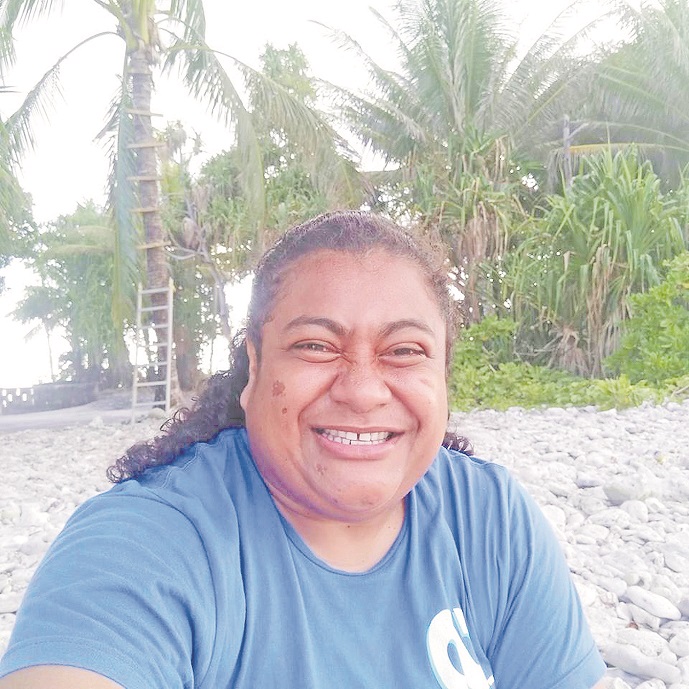WALKING the road less travelled by women pushing into the coaching ranks of male sports is Fiji’s Elenoa Kunatuba who became the head coach of the Tuvalu men’s rugby 7s team in 2018.
What is even more exceptional is that the experienced 38-year-old does not think this is anything special — in fact, Kunatuba’s mind-set is that coaching a men’s team is just her job and she is as normal as the “next guy”.
The Fijian coach said what was more challenging than dealing with a few raised eyebrows as the female coach of the Tuvalu men’s rugby 7s team, was familiarising herself with the culture and language of Tuvalu.
“The way I look at it, I’m just doing my job,” said Kunatuba.
“In the beginning, I had to adjust myself to Tuvalu culture and language, and then how they would accept me as a female coaching men’s rugby.
“I just told them, ‘look I’m not a female coach, I’m just a coach’. My team just see me as a rugby coach that is going to develop them and make them better players.”
Navigating the cultural spaces and gender norms between men and women in Tuvalu was something that Kunatuba had to approach gently.
The soft-spoken coach remembers the exact moment when her team finally accepted her as “one of them”, which happened after some hesitations while the players were getting used to having a ‘fafine’ (female) coach.
“In the beginning they were not used to me because I was a female and they felt a little embarrassed with me so when it would come to do a huddle, everyone had their arms around each other and closing the gaps but there would still be that space between me and them,” she laughed.
“After Oceania (Rugby Sevens Championships) last year, the boys were doing a huddle and I was taking my time walking towards them, and one of them yelled out to me ‘Come on, we are waiting for you!’, then they grabbed me into the huddle and they closed the space.
“That’s when I knew that I had broken through that barrier and it didn’t matter that I was a female anymore,” she said with a big smile.
Her commitment to her players’ personal wellbeing and family-oriented approach to her coaching has been pivotal in enabling her to gain the trust and respect of her players; it is about being a professional, caring and dedicated coach and has nothing to do with gender.
Kunatuba went so far as declining the option to fly to the Samoa 2019 Pacific Games, opting instead to travel the 77-hour boat trip with her team, enduring extreme sea sickness and loss of appetite along the way.
Overcoming a perilous sea journey is just one of many challenges she has successfully navigated in her rugby career.
Entering rugby in 2000 as a player she went on to start her own rugby team in 2005 with the creation of the Seahawks women’s 7s team, all at a time when gender stereotypes in Fiji strongly opposed the idea of women playing rugby.
Her breakthrough into coaching national teams came in 2010 when she was picked to coach the national women’s team of India. Upon her return to Fiji a year later, she began coaching the Fijiana women’s 7s rugby team while simultaneously assuming the role as the women’s development officer for Oceania Rugby which was a first of its kind in the region and in the world.
Her work during that time was groundbreaking as she travelled around the region to help establish women’s rugby particularly in Tonga and Samoa. In 2016 she travelled to New Zealand to take on the head coach role for the Marist women’s 7s rugby team in Hamilton before taking on coaching her first national men’s 7s team for Tuvalu in 2018.
Kunatuba hopes that her story inspires more women to take up coaching.
“It’s about changing mind-sets. Now it feels normal to them (players) to identify me or point me out as their coach to others that are curious about me; it’s a normal everyday thing. For the older generation, I think it must still be different to them and I respect that but when it comes to doing my job, I do what I have to do.
- Freelance journalist Liz Ah-Hi was a participant at the ‘Equal Playing Field — Fair Reporting for Women and Sport workshop held in Samoa prior to the 2019 Pacific Games, to encourage a fair and equal media approach for women in sport. The views expressed are hers and not of this newspaper.




